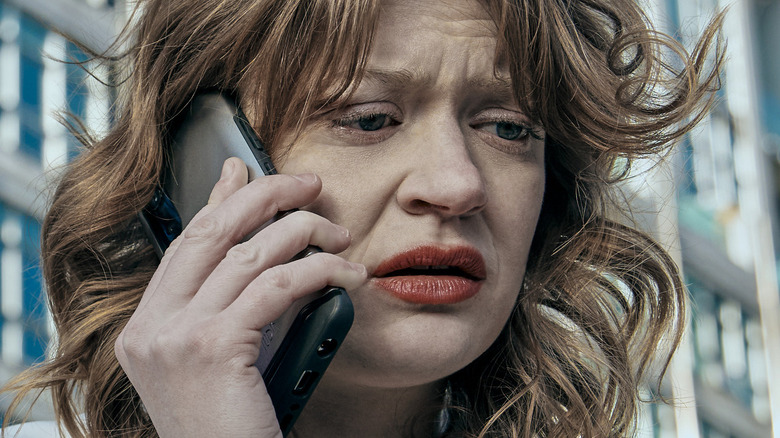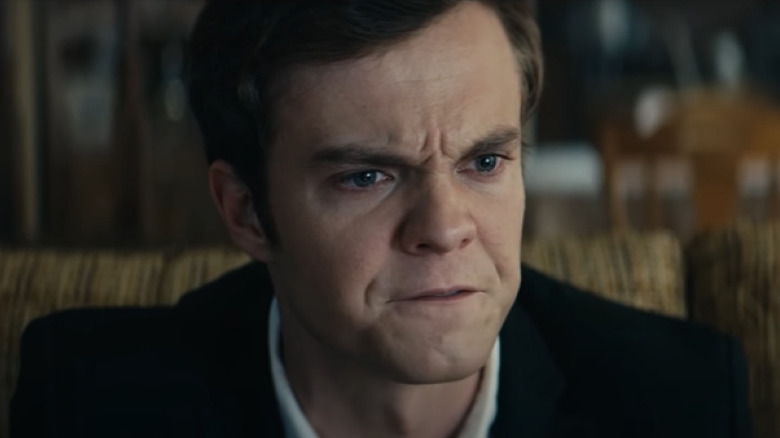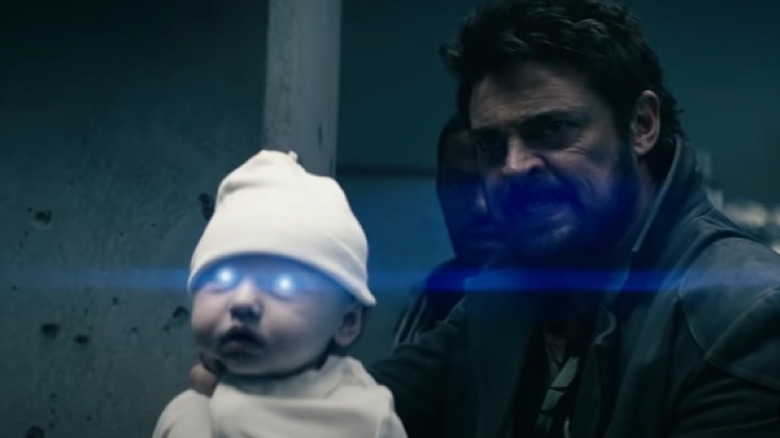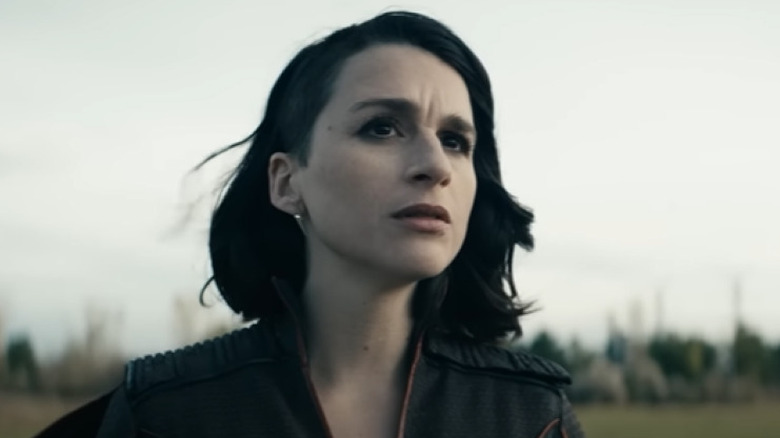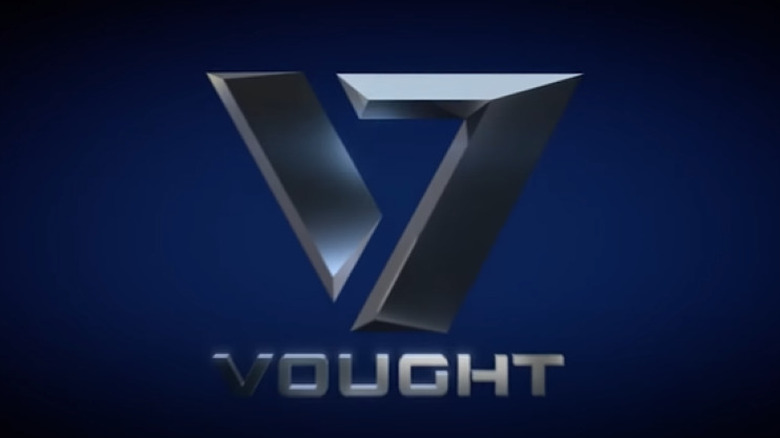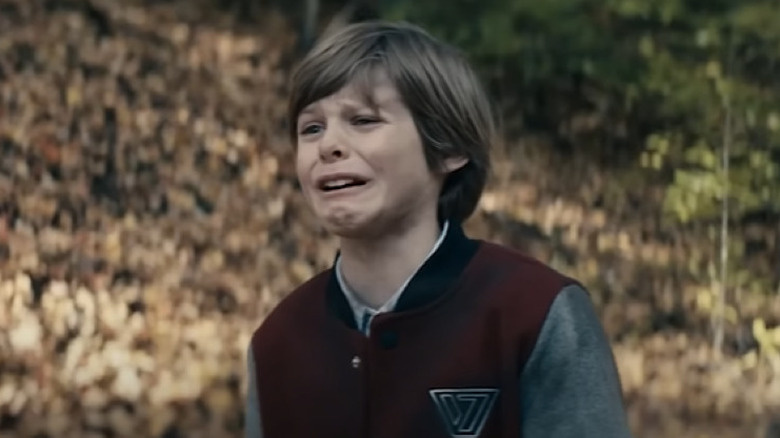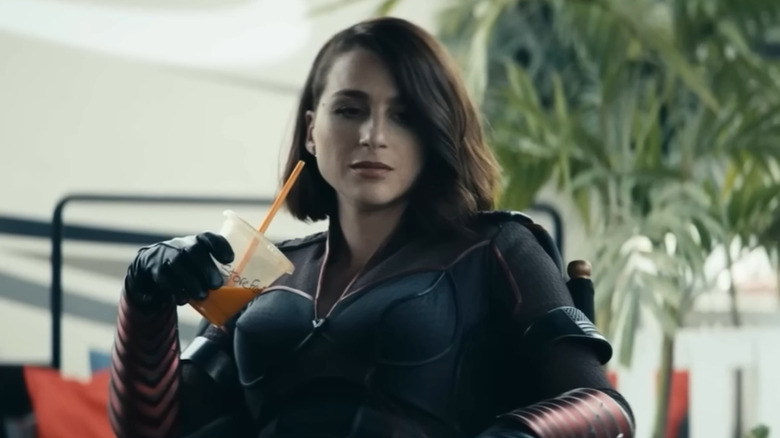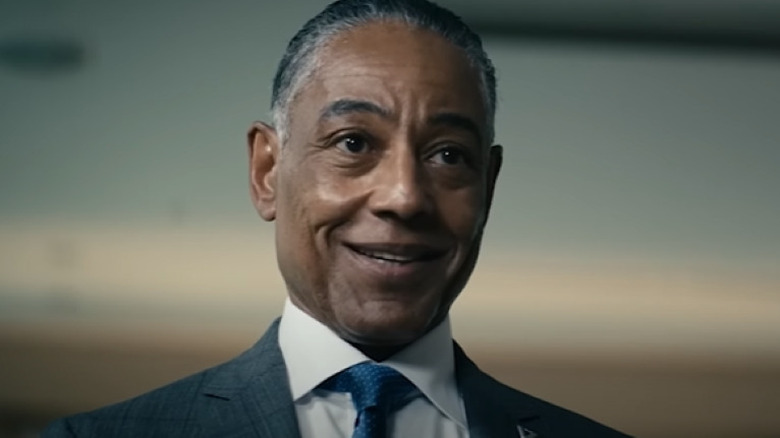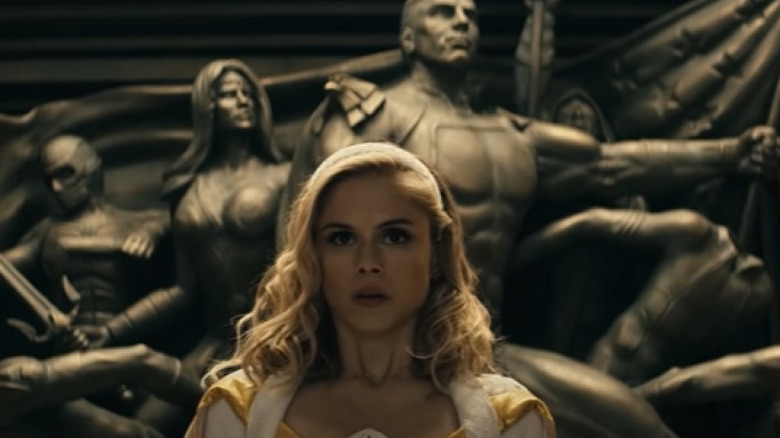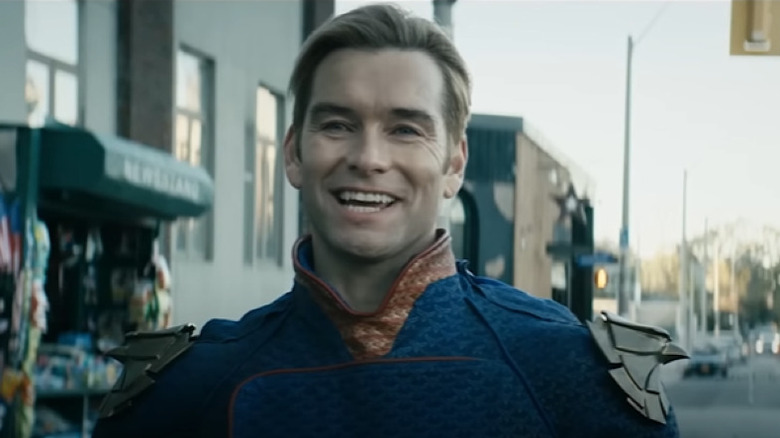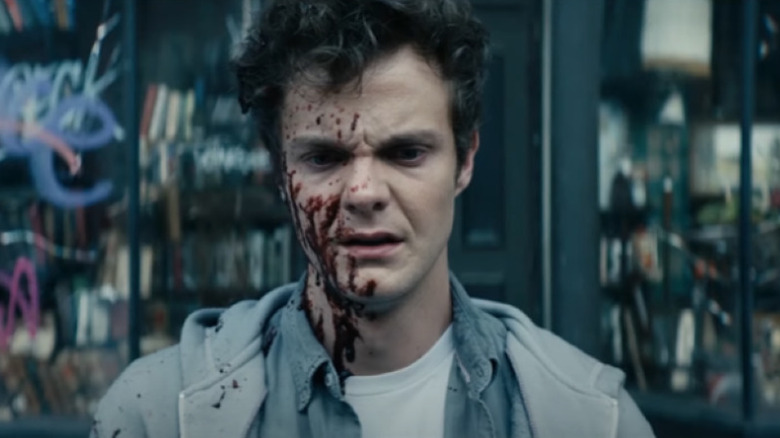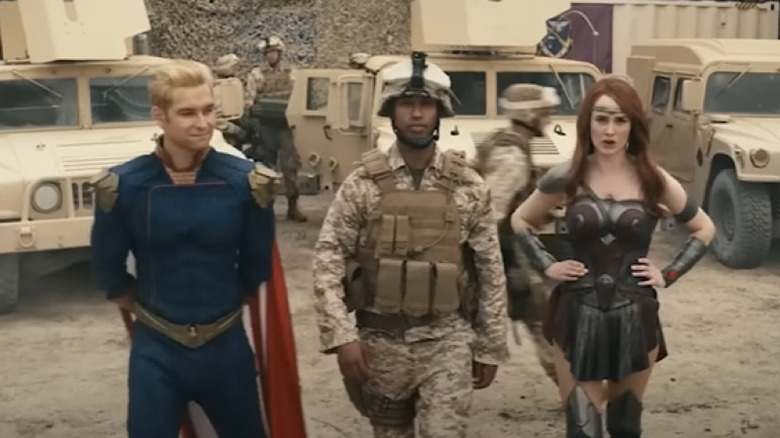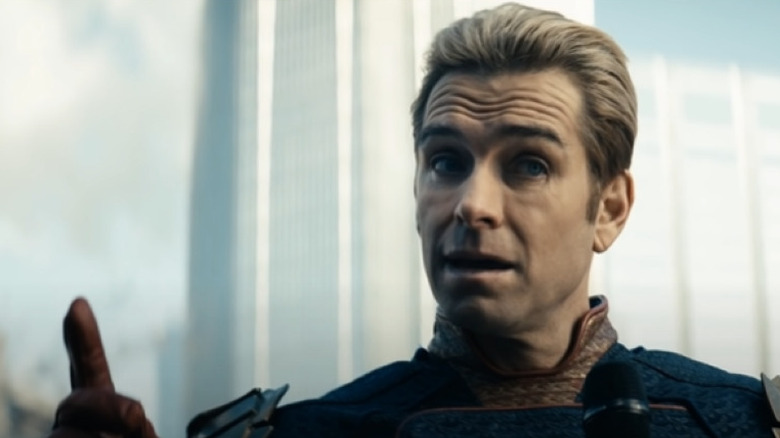The Biggest Plot Holes In The Boys
Critically acclaimed Amazon Prime series "The Boys" delivers a subversive take on the superhero genre that is positively bursting with political satire and gory violence. Here, superheroes are widely beloved celebrities with corporate backing. But behind closed doors, most of these illustrious do-gooders are actually cold, cruel monsters. The titular Boys, a hard-edged group of vigilantes, work tirelessly to expose their dirty little secrets and bring them down.
"The Boys" is well-regarded for its carefully-crafted storylines and thoughtful characters. The fact that the series juggles a lot of plot points, narrative arcs, super-teams, betrayals, secrets, and legacies makes this even more impressive. By and large, this multitude of story elements converges in fascinating ways. But like so many complex genre productions before it, "The Boys" isn't immune to the dreaded plot hole. From the curious lack of supervillains to Vought International's terrible security, these are the biggest plot holes in "The Boys."
How does Compound V work?
The Boys wouldn't have anything to hunt were it not for the super serum known as Compound V. A primary plot device of the series, we learn early on that Compound V transforms ordinary humans into immensely powerful beings generally referred to as "supes." It is further revealed that Compound V was developed in Nazi Germany, and that it can be diluted into lesser forms, including V24, which grants superhuman abilities for a 24-hour period.
The explanations and examples of Compound V can get exceedingly complicated. However, there is one obvious inconsistency regarding how the serum actually works. How does Compound V choose which powers a person will receive? Throughout the show, we see a varied display of abilities, from mind control to super-speed to extendable appendages. Biologically, all these superpowers work in very different ways — yet they all come from the same serum.
It seems like there should be different serums that enhance different talents, or perhaps that Compound V gives everyone the same abilities. Certainly, audiences are required to dispel a reasonable level of doubt when it comes to characters being able to fly or shoot laser beams from their face. Still, the randomness with which Compound V enhances people deserves some explanation. Until then, this inconsistency will remain one of the most hotly debated in the fandom.
How are there so many supes?
A significant argument the titular Boys use in their fight for "justice" regards the monopoly one company has over the creation of supes. Multi-billion dollar conglomerate Vought International was founded by the inventor of Compound V, and holds exclusive rights to the serum. Through it, Vought not only gives people powers, but exploits them for financial gain. Vought's homegrown super-team, the Seven, is featured particularly prominently among the company's many endeavors: They're the subject of multiple films, tons of merchandise, and even an amusement park.
This introduces a major plot hole. If Vought International is the only company capable of making superheroes, and they want to squeeze the most out of their exclusive rights, how are there so many supes in the world? There seem to be far more superpowered people than the company can track: "Herogasm" alone features a mammoth party filled with enhanced beings. Vought is also responsible for the majority of rogue supes flying around, due to experiments like the one that gave Starlight her powers. It would clearly be more beneficial for the conglomerate to limit their competition. Moreover, with the most powerful supes around in the company's roost, why not eliminate the growing population of freelancers? Vought has certainly proven it's not above these kinds of underhanded and illegal activities — and yet no action is taken.
Why did Stormfront lay low for so long?
A significant plot hole in Season 2 of "The Boys" involves the arrival and origins of the newest member of the Seven, Stormfront. This electrically-powered antagonist causes havoc for nearly every character in the series. Much of this season's story builds up to the reveal that Stormfront is the slow-aging former wife of Vought founder Frederick Vought. And that's not all: She was also a member of the Nazi Party during World War II. In the modern day, she intends to use her influence as a member of the Seven to sell her white supremacist agenda to the general public.
Her plan fails, but a big question mark remains: Why did Stormfront wait so long to resurface and enact her plan? As one of the first superpowered people in history, Stormfront could have manipulated social and political events to serve her agenda multiple times throughout the 20th century. Lying low while more and more supes were created only increased the challenge she ends up facing. As a member of the Nazi Party, it makes sense that Stormfront would vanish for a period of time following the end of World War II. But three-quarters of a century really seems like overkill.
Vought's serious lack of security
Vought International has its hands in a lot of pies, as showcased on the fictional company's real-world website. Subdivisions of Vought cover everything from chain restaurants to pharmaceuticals to its primary source of revenue, entertainment. However, Vought also makes a significant portion of its cashflow as a defense and arms contractor. Aside from having a monopoly on the juice that turns people into superpowered beings, Vought also manufactures weapons and military supplies, and has its own crime analytics department. But all this heavy investment in defense and security is at the heart of one of the series' biggest discrepancies: Why is it so easy to break into Vought Tower?
Billy Butcher and his rag-tag group of vigilantes somehow manage to break into what is arguably the most valuable and corrupt company in the world's main headquarters on several occasions — at least once per season, in fact. Additionally, important pieces of intel and equipment, including vials upon vials of Compound V and V24, easily slip out the front door. A multi-billion dollar company with a ton of secrets to hide would realistically be keeping a better eye on their assets. Security would become even more integral after multiple people are found murdered on-site. Even if superheroes regularly live and work on the premises, some added defense seems reasonable. But the absence of armed guards in "The Boys" Season 3's ending insinuates that Vought Tower is less patrolled than ever.
Why does Billy Butcher abandon Ryan?
Nobody is guilty of calling Billy Butcher a good person. Even as the leader of the Boys, he pays no mind to making friends until it serves his own needs. Cussing and complaining his way to his ultimate goal of taking down Vought and the Seven once and for all, Billy lets nothing get in his way — and unfortunately, that includes his stepson, Ryan Butcher. A primary plot thread through much of the series centers around Butcher's strained relationship with his wife and stepchild, who he eventually discovers is the illegitimate son of his sworn enemy, Homelander.
Despite this reveal, Billy remains dedicated to his stepson's well-being, especially after his wife's death — until he isn't. Why does he abandon Ryan so easily? It's evident that Ryan is confused about his paternal figures. To him, Homelander seems like the only father who actually wants to be part of his life. Billy is given multiple chances to offer his stepson stability; however, by the beginning of Season 3, he abandons Ryan to the care of the former Deputy Director of the CIA, Grace Mallory. The Boys' leader breaks the promise he made to his late wife, that he would always care for Ryan, without an obvious reason. In doing so, he leads the impressionable and powerful boy into the arms of the dangerously unstable Homelander, whose dark history speaks for itself.
Stormfront's unceremonious death
Out of all the plot holes on this list, this is the most likely to be rectified in upcoming episodes of "The Boys." Still, it's worth mentioning that one of the show's most perilous antagonists dies without much attention. As a member of the Seven, Homelander's partner, and a white supremacist, Stormfront gives audiences plenty of reasons to hate her. However, after revealing that Stormfront is still alive at the beginning of Season 3, the show kills her off-screen in extremely unceremonious fashion.
Arguably, the series is simply opting to keep Stormfront in their back pocket for a later reveal. But including the character in Season 3 just to brush over her death makes little sense. Intensifying this confusion is the fact that it was already uncertain whether the character survived the climactic conclusion of Season 2. Fans were elated to discover that the well-hated Stormfront survived in a TV Line interview with showrunner Eric Kripke. Kripke not only revealed her status, but promised to curse her with a worse fate: "The best poetic ending for that character," he remarked, "is someone who so believed in some kind of pure race finds herself mutilated and having to live with it for potentially centuries." If this is the case, it makes Stromfront's off-screen death even more unsatisfying. What really happened to her?
Do Vought's tracking chips work?
There are mentions of Vought's tracking chips sprinkled throughout "The Boys." A prominent example arrives in Season 2's "The Bloody Doors Off," when Starlight has her chip removed by Frenchie. The surgical procedure is considered necessary as she grows ever-closer to becoming a regular member of Billy Butcher's crew. However, Starlight remains a member of the Seven throughout the remaining episodes, and most of Season 3 ... and the missing tracking chip doesn't seem to stir up any issues for the starlet, nor does Vought want to implant a new one. Do the microchips even work the way that they're supposed to? Does Vought even know that Starlight's has been removed? Why does Vought International even have tracking chips if they're not going to use them?
One Reddit user has highlighted further inconsistencies by asking how the chips get implanted in the first place. Supes have increased strength, and, in many cases, impenetrable skin. How exactly does the company manage to surgically place a microchip inside of bulletproof characters like Translucent? Perhaps Vought fakes the whole tracking chip transaction and simply relies on the fear it instills in their heroes. Unfortunately, if this theory is accepted, it creates further plot holes regarding how Vought still manages to know where their commodities are when it's necessary to the plot.
The implications of V24
V24, also referred to as Temp V, is a diluted version of Compound V that grants humans superpowered abilities for a 24-hour period. It's also probably the number-one source of plot holes in "The Boys." Kicking off these inconsistencies is the simple fact that so many vials of this unstable compound exist. If Vought International is only experimenting with the potential of this temporary serum, why are there so many vials available? There are enough lying around to afford Billy Butcher a plentiful supply, which the company hardly notices is missing. Secondly, why hasn't Vought International discontinued the use of Compound V? The company is aware that its superpowered commodities tend to become liabilities. Vought also wouldn't care if V24 eventually killed their superheroes. So why not limit when and where people can use their abilities? It's not like the company isn't already ruthless.
The worst plot hole involving V24 regards the fact that three to five doses have fatal consequences. We witness Hughie take four doses, while Billy takes six. Billy is at the edge of death at the end of Season 3, but Hughie isn't. Shouldn't Hughie be a little worse for the wear? Additionally, the lethal level means that Mother's Milk or Frenchie could have safely opted for a single shot of the temporary enhancement to prepare for the climactic Season 3 final battle. But they don't, for no apparent reason.
Get these heroes some therapy
One questions looms above the rest when it comes to plot holes in "The Boys": Where are all the therapists? Vought International has built the world's premier team of superheroes. The corporate behemoth expects them to be the saviors of the planet and act as representative faces of the entire company. Yet one of the most massive conglomerates in the world can't shell out the funds needed to get the Seven some much-needed counseling. Considering the amount of money Vought likely spends on covering up their star heroes' atrocities, it's ridiculous that they don't offer proactive support to their employees. There's basically no way therapy isn't a money-saving venture.
This discrepancy becomes more obvious the higher Homelander's body count rises. Worse, at the beginning of the series, Vought hires middle-American damsel Starlight, making her a celebrity and symbol of their multi-billion dollar corporation virtually overnight. She receives no help in dealing with this. Moreover, when she suffers in-house sexual misconduct, Vought fails to offer her anything even approaching the necessary counseling. Vought should, realistically, be lending her some kind of hand, even if it's just a token gesture meant to protect themselves from later legal issues.
How are the Boys still alive?
Simply put, it's beyond miraculous that the show's eponymous characters have survived as long as they have. Of course, protagonists overcoming the odds is what makes shows like "The Boys" entertaining to watch. However, there might be no other characters in modern TV who are luckier to be alive than Billy Butcher's crew.
The Boys' enemies are the most powerful entities in their known universe. Homelander alone could effortlessly dispose of the powerless Butcher, and has killed people for causing far less trouble than the Boys stir up. Moreover, in Season 3, Homelander unexpectedly arrives at the Butchers' house, illustrating that the supe can track down and eliminate his adversary at any time. And yet, he doesn't. Maybe, as one Reddit user proposed, Butcher hallucinates the whole event. Or maybe this is just a major plot hole.
Vought International is well aware of the trouble the Boys cause them. It's doubtful that the underhanded company hasn't put a bounty on the heads of the crew that continues to break into their headquarters and murder their commodities. Yet, somehow, the Boys continue to live another day to muck things up further for Vought and the Seven — never mind the many other godlike beings the group finds itself battling.
The power imbalance
For all its success, Vought International doesn't seem to be operated by very intelligent people. This collection of dummies could avoid multiple catastrophes simply by employing a few extra guards and a couple of psychiatrists. But perhaps the biggest and most foolish mistake the company makes is ignoring the blatant imbalance of power they're sitting on the winning end of.
Audiences are led to believe that Vought International has a monopoly on superheroes and the robust ability to make more. So ... why haven't they taken over the entire world? There are seven individuals on their payroll who can handily defeat entire armies of simple mortals armed with what might as well be pellet guns. A hundred or so more doses of Compound V, and Vought International could overrun countless nations in a matter of days. Even if Vought has no interest in world domination, it's exceptionally doubtful that the political leaders of the United States wouldn't use the fact that they're the only country with superheroes to extend their global reach.
Where are the supervillains?
One of the most interesting aspects of "The Boys" is the narrow line it maintains between good and evil. Seemingly every character on the show is some sort of antihero, with some leaning more towards anti than hero, and vice versa. This is satisfyingly complex, but as the show marches on, the absence of pure supervillains becomes more and more evident. To the audience, Homelander and most of the Seven are the villains our heroes are expected to overcome. However, in-universe, the public sees the Seven as beaming gods of protection — but protection from whom, exactly?
Few people in this fictional world know who Billy Butcher is, as the Boys are well-protected by the CIA. So who are the Seven fighting, to have convinced the citizenry to view them as heroes? Vought continues to pump out movies about their celebrity supes, some of which must feature traditional supervillains. Unfortunately, none of these super-enhanced criminals appear in "The Boys." Until audiences watch Homelander and the Seven save the world from invading aliens or tyrannical evil geniuses, the lack of supervillains remains a bizarrely wide plot hole.
